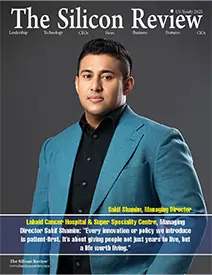>>
Industry>>
EdTech>>
How Nil Adell-Mill is Teaching...How Nil Adell-Mill is Teaching Machines to Reinvent Chemistry through a New Biology
The Silicon Review
15 September, 2025
By Akanksha Harsh
In the 21st century, few frontiers are as transformative as artificial intelligence and biology. For Nil Adell-Mill, an entrepreneur, scientist, and AI engineer, this convergence is the foundation of his life’s work.
Adell-Mill represents a new generation of scientists shaping how humanity makes things. He has developed patented machine-learning methods which have helped launch cancer vaccines into clinical trials and recently co-founded Decycle Biosystems, a company reinventing chemistry through AI-driven biomanufacturing. These, among other achievements.
From humble beginnings
Adell-Mill’s journey began in Spain, where he studied biomedical engineering at Pompeu Fabra University. There, he founded one of Barcelona’s first-ever iGEM teams, introducing synthetic biology to his campus. This was the first of its kind in his university.
His early research already reflected his lifelong fascination with both human and artificial intelligence. During an internship at Duke University, he joined a pioneering neuroscience lab studying brain–machine interfaces. This same lab would later inspire the founders of Neuralink.
Adell-Mill helped design a virtual reality system for primates to explore how the brain encodes motion, which was an early intersection of data, biology, and intelligence.
He later earned a master’s in Neural Systems and Computation from ETH Zurich, one of the world’s leading institutions for AI and systems science. There, Adell-Mill explored applications ranging from AI privacy in crypto startups to personalized cancer vaccines in Belgium and polymer design at IBM Research. Across every project, one principle remained constant: using intelligence to accelerate biology.
Redefining the future of drug discovery
As part of teams pioneering AI-powered immunotherapy, he co-invented a patented machine-learning method for predicting immune responses to novel proteins, now protected across the U.S., Europe, Japan, and China. This breakthrough became instrumental in prioritizing neoantigen targets and supporting first-in-human vaccine programs for non-small cell lung cancer (NSCLC).
He was among the first to introduce transformer-style models—the architecture behind modern large language models—into immunotherapy and proteomics pipelines as early as 2019, years before the LLM wave transformed global industries. “We were focused on internal decision-making, not hype,” Adell-Mill recalls. “The goal was to make discovery smarter and personalized to the individual patient, opening completely new avenues for the treatment of disease.”
In a subsequent role, Adell-Mill co-developed a precision-immunomics platform for tumor-specific target identification, work later presented at the Society for Immunotherapy of Cancer and published in the Journal for Immunotherapy of Cancer. His work has contributed to patents, scientific publications, and multiple startups built from the ground up.
Building the future
Today, Adell-Mill is the Co-Founder and Head of AI at Decycle Biosystems, where he and his team are engineering a new model for sustainable chemistry. The company applies generative models and enzyme-design workflows to create bio-based alternatives to petrochemicals, building a foundation for clean, cell-free biomanufacturing.
“We’re living through two industrial revolutions at once,” says Adell-Mill. “One in AI, where intelligence is becoming a tool for creation. And one in biology, where we’re learning to engineer life itself. Decycle sits right at that intersection, teaching intelligence to create with biology.”
The company’s goal is to make sustainable chemistry both scalable and affordable, translating the successes of drug discovery into cleaner ways of manufacturing materials, fuels, and everyday chemicals.
Until recently, AI engineers and biotechnologists rarely shared a common language. Adell-Mill has spent his career bridging that gap. “Translating AI into robust, scalable tools for biology remains one of the hardest challenges,” he says. “Many promised that AI would solve drug discovery, but biology is still humblingly complex.”
Indeed, while thousands of AI-driven biotech startups have emerged, very few have reached clinical trials, and none have yet delivered an approved AI-discovered drug. Adell-Mill points to data as the core challenge. His teams learned to creatively augment limited datasets, generate synthetic data, and design smarter, faster experimental systems. “Over time, we realized the goal isn’t to run more experiments, it’s to run the right ones.”
This experience now informs Decycle’s approach to biocatalytic data, where intelligent design and data-driven iteration enable the discovery of new enzymes capable of powering cleaner chemical production.
Lessons in innovation
For Adell-Mill, success in deep tech is about mastering complexity while staying adaptable. “Go deep, but stay flexible,” he advises. “It’s powerful to understand a field in painful detail, but it’s equally important to pivot when curiosity shifts. Expertise transfers more than people think.”
His career embodies that philosophy, moving seamlessly from neuroscience to cancer immunology to green chemistry. These endeavours are unified by one vision: using intelligence to make biology, and the world, more powerful.
As Decycle Biosystems continues to grow, Adell-Mill remains focused on scaling its platform globally. He also mentors early-stage founders in AI and biotech, helping shape the next generation of innovators.
“The next industrial revolution will be biological,” Adell-Mill says. “And it’s already underway.”
_2025-11-17_06-38-14.webp)


 (1)_2025-10-21_13-35-14.webp)

_2025-10-02_10-21-48.webp)
